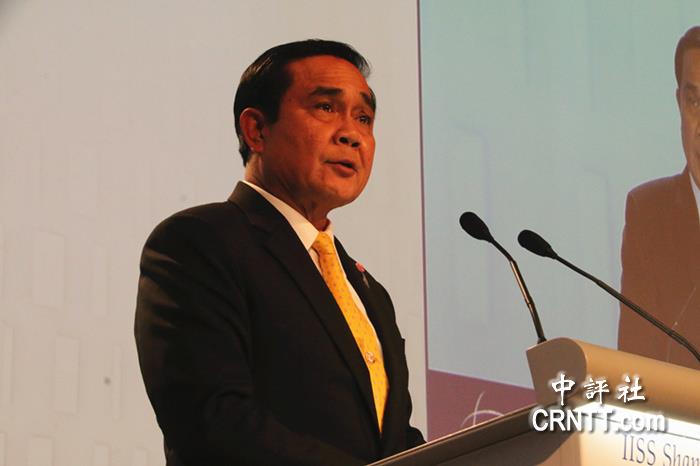
|
| 泰國總理巴育為今年的香格里拉對話做主題發言。(中評社 楊犇堯攝) |
5. We live in a globalised world without borders, because if advances in transport and communications technology that can connect us within seconds. This can cause both crisis and bring opportunity. The challenges that we face are increasingly transnational. So from now on, we must truly share not only in each other’s happiness and success, but also in each other’s trials and tribulations. And because of this, the international community is gradually moving from a mind-set of “One Country, One Destiny,” to “One World, One Destiny.” All countries should therefore join together to consider how to resolve problems and address the challenges that we face on the basis of equitable benefit, aiming to increase mutual trust and confidence.
Distinguished Guests,
Ladies and Gentlemen,
(II) Regional Architecture: Lacking Proper Equilibrium
6. The regional architecture today lacks proper equilibrium. Resolving the security challenges in the region together requires that we have in place a good regional architecture. The end of the Cold War brought about changes to the regional architecture, creating a multipolar situation without clear-cut rules and regulations, which has led to greater uncertainty and represents a growing challenge for all countries in the region, particularly for small and developing countries.
7. Today, the security and potentials of the Asia-Pacific region are pull factors for many countries to expand their role in the region, politically, economically and socially. The United States has its rebalancing policy and its policy to move forward the TPP[1], in which Thailand has expressed interest and is expediting the consideration process through studies and public hearings with all sectors. I hope that TPP members would also help consider some possible effects of the TPP as well, which would help many countries expedite their decision to join. In addition, China has its “One Belt, One Road” policy and is seeking to advance free trade through the FTAAP[2] and RCEP[3], while Russia has a policy focusing on Asia and the Eurasian Economic Union, and India has its “Act East Policy.”
8. In my view, the United States, China and Japan remain the most important players in the region, while India, Russia, Australia, South Korea and ASEAN are becoming more important. As for China, while it considers that its economic growth and the development of its security capabilities are being carried out in a peaceful and constructive manner, many countries remain concerned that these developments will affect the balance of power and security in the Asia-Pacific region. I believe that ASEAN must be united and increase its role in building a strategic new equilibrium in the region in order to support an atmosphere of peace and enable all sides to abide by principles, regulations and values that are universally accepted as constructive. It has been nearly half a century since ASEAN’s founding, and ASEAN has clearly demonstrated that it is able to create a zone of peace among its members, some of whom were in conflict in the past, and has achieved the goals envisioned by its founding fathers in becoming a dynamic community.
|